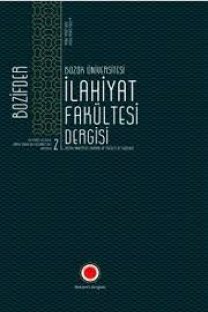SEBEB-İ NÜZÛL RİVÂYETLERİ BAĞLAMINDA ÂL-İ İMRÂN SÛRESİNİN 1-80. ÂYETLERİ VE MUHKEM-MUTEŞÂBİH MESELESİ
Muhkem-muteşâbih meselesi, Hz. Peygamber ve sahabe dönemleri hariç tutulursa başlan- gıçtan bu yana tartışılan ve üzerinde ittifak sağlanamayan hususlardan birisidir. Üzerinde ittifak sağlanamamasının en önemli sebeplerinden biri kanaatimizce, konunun sebeb-i nüzûl bilgileri dikkate alınmadan değerlendirilmesi ve mecrasından uzaklaştırılmasıdır. Böyle olduğu içindir ki zaman içerisinde Kur’ân’ın tamamı muhkem-muteşâbihin ko- nusu hâline getirilmiş ve muhtelif mezhep mensupları kendilerine göre listeler oluştu- rabilmiştir. Bu durum da bir mezhebe göre muhkem olan bir âyetin bir başkasına göre muteşâbih kabul edilebilmesi sonucunu doğurmuştur. Meselenin özüne uygun bir bi- çimde ortaya konulabilmesi için Âl-i İmrân sûresinin nüzûlüne dair kaynaklarımızda yer alan bilgilerin dikkatlice analiz edilmesinden başka çıkar yol gözükmemektedir. Bu bilgi- ler dikkate alındığında sûrenin ilk seksen küsur âyetinin, Hz. İsa’nın tanrılığı bağlamında Necrân Hıristiyan heyetiyle Hz. Muhammed arasında yaşanan tartışmalar üzerine nazil olduğu anlaşılmaktadır. Konuyu, sebeb-i nüzûle dair bu bilgiler çerçevesinde inceleyen araştırmaların yokluğu -bir makale hariç ki onun da bizim ulaştığımız sonucu ortaya koymadığı görülmüştür- bizi bu çalışmayı yapmaya sevk etmiştir.
Verses of 1-80 of Sûrat Âl-‘Imrân and the Question of Muhkem-Mutashâbih in the Context of Esbâb-ı Nuzûl Narrations
The question of muhkem-mutashâbih is one of the issues that have been discussed since the beginning except for the periods of the Prophet and his Companions and have not been reached a consensus on. One of the most important reasons for the lack of consensus is the fact that the subject is to be generally evaluated without considering the esbâb-ı nuzûl narrations and deviated from its conduit. As such, the whole of the Qur’an has become the subject of muhkem-mutashâbih and the members of various sects have created lists according to themselves. This has resulted in the fact that one verse, which is muhkem according to one sect, can be accepted as mutashâbih for an- other. In order to be able to put forward the essence of the issue, there is no other way to carefully analyze the information contained in our sources about the revelation of Surat Âl- ‘Imrân. When this information is taken into consideration, it can be seen that the first eighty verses of the surah are based on the discussions between the Christian delegation of Najran and Muhammad in the context of the godhood of Jesus. The ab- sence of studies examining the subject within the framework of this information about the esbâb-ı nuzûl - except for one article, it was seen that it did not reveal the result we have reached - led us to do this research.
___
- Abduh, Muhammed - Reşid Rıza, Muhammed. Tefsîru’l-Menâr (Tefsîru’l- Kur’âni’l-Hakîm). Kâhire: Dâru’l-Menâr, 1947.
- Ateş, Süleymân. Yüce Kur’ân’ın Çağdaş Tefsiri. İstanbul: Ufuk Neşriyat, 1992.
- Begavî, Ebû Muhammed Huseyn b. Mes’ûd. Meâlimu’t-tenzîl. Riyad: Dâru Tayyibe, 1409/1988.
- Derveze, Muhammed İzzet. et-Tefsiru’l-hadîs. 3. Baskı. Beyrut: Dâru’l-Garbi’l- İslâmî, 2000.
- Elik, Hasan - Coşkun, Muhammed. Tevhid Mesajı Özlü Kur’ân Tefsiri. 2. Baskı. İstanbul: Marmara Üniversitesi İlahiyat Fakültesi Vakfı Yayınları, 2015.
- Ferrâ, Yahya b. Ziyâd. Meâni’l-Kur’ân. 3. Baskı. Beyrut: Âlemu’l-Kutub, 1403/1983.
- İbn Âşûr, Muhammed Tâhir. Tefsiru’t-tahrîr ve’t-tenvîr. Tunus: Dâru’t- Tûnisiyye, 1984.
- İbn Ebî Hâtim, Abdurrahman. Tefsîru’l-Kur’âni’l-Azîm. Riyad: Mektebetu Na- zar el-Bâz, 1417/1997.
- İbn Hişâm, es-Sîratu’n-nebeviyye. Beyrut: Dâru’l-Kitâbi’l-Arabî, 1990.
- İbn İshâk, Muhammed. es-Sîratu’n-nebeviyye. Beyrut: Dâru’l-Kutubi’l-İlmiyye, 2009.
- Kurtubî, Ebû Bekir. el-Câmi‘ li ahkâmi’l-Kur’ân ve’l-mubeyyin limâ tezammenehû mine’s-sunneti ve âyi’l-furkân. Beyrut: Muessesetu’r-Risâle, 1427/2006.
- Mâturîdî, Ebû Mansur Muhammed b. Mahmud. Te’vîlâtu ehli’s-sunne. Beyrut: Muessesetu’r-Risâle, 1425/2004.
- Mukâtil b. Süleymân. Tefsîru Mukâtil b. Süleymân. Thk. Dr. Abdullah Mahmut Şahhâte. Mısır: el-Hey’etu’l-Mısriyyetu’l-Âmme, 1979.
- Öztürk, Mustafa. “Müteşabih Kavramı Bağlamında Tefsir Usûlü’nün (Ulûmu’l- Kur’ân) Mahiyeti Ve Pratik Değeri Üzerine Bir İnceleme”. Bilimname 4/15 (2008): 29-46.
- Râzî, Fahruddîn. Mefâtîhu’l-gayb. Beyrut: Dâru’l-Fikr, 1401/1981.
- Suyûtî, Celâlüddin Abdurrahman b. Ebî Bekr. el-İtkân fî Ulûmi’l-Kur’ân Bey- rut: Dâru’l-Kutubi’l-İlmiyye, 2015.
- Taberî, Muhammed b. Cerîr. Câmiu’l-beyân fî te’vîli âyi’l-Kur’ân. Beyrut: Dâru’l-Fikr, 1415/1995.
- Zemahşerî, Mahmud b. Ömer. el-Keşşâf an hakâiki gavâmizi’t-tenzîl ve uyûnu’l- ekâvîl fî vucûhi’t-te’vîl. Riyad: Mektebetu’l-Ubeykân, 1418/1998.
- Yayın Aralığı: Yılda 2 Sayı
- Başlangıç: 2012
- Yayıncı: Salih KARACABEY
Sayıdaki Diğer Makaleler
Maliki Hukukunda Kefâet: On Beşinci Yüzyıldan Bir Fas Fetvası
ZEMAHŞERÎ’NİN RU’YETULLAH GÖRÜŞÜ ÜZERİNE BİR DENEME
F.C.S. Schiller’in Pragmatik Hümanizmi ve Hume’un Nedensellik Anlayışı Arasındaki İlişki
SAYGI DEĞERİ BAKIMINDAN KUR’AN’DA ÖNE ÇIKAN HUSUSLAR
KUR’ÂN’DA KORKU TÜRLERİTypes of Fear in Quran
Sebeb-i Nuzûl Rivayetleri Bağlamında Âl-i İmrân Suresi 1-80 Ayetleri ve Muhkem-Muteşâbih Meselesi
DÂRİMÎ’NİN BAZI HADİSLERDEN SONRA YAPTIĞI AÇIKLAMALAR (SÜNEN BAĞLAMINDA BİR DEĞERLENDİRME)
Kâtib Çelebi’nin Mîzânü’l-Hak Fî İhtiyâri’l-Ehak Adlı Eseri Özelinde Mûsiki Hakkındaki Görüşleri
